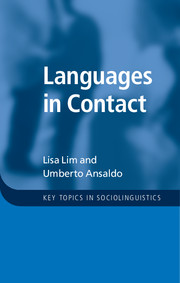Book contents
- Frontmatter
- Contents
- List of figures
- List of tables
- Preface
- Acknowledgements
- List of abbreviations
- 1 Perspectives on contact
- 2 Contact and code choice
- 3 Contact and creole formation
- 4 Contact and language evolution
- 5 Contact and ecology
- 6 Contact and shift
- 7 Contact and globalisation
- 8 Reflections and future directions
- References
- Index
2 - Contact and code choice
Published online by Cambridge University Press: 05 November 2015
- Frontmatter
- Contents
- List of figures
- List of tables
- Preface
- Acknowledgements
- List of abbreviations
- 1 Perspectives on contact
- 2 Contact and code choice
- 3 Contact and creole formation
- 4 Contact and language evolution
- 5 Contact and ecology
- 6 Contact and shift
- 7 Contact and globalisation
- 8 Reflections and future directions
- References
- Index
Summary
INTRODUCTION
One of the outcomes of languages and speakers coming into contact is increased multilingualism. It is worth identifying systematically the various scenarios that bring communities together and that put the pressure on adding language varieties to the repertoire. This chapter then proceeds to outline how, in such situations where more than one code is present, these codes may be (a) distributed in society and (b) exploited by the community. In the final section we examine some of the more recent, postmodern approaches which deconstruct the notion of multilingualism.
There was once a prevailing belief in some quarters that having more than one language in one's individual or collective repertoire could be considered a liability. Nineteenth-century nationalists promoted the ‘one nation = one language’ ideology, and even in contemporary times such an ideology persists. Theodore Roosevelt, as President of the United States of America, in 1906 declared: ‘We have room for but one language in this country, and that is the English language, for we intend to see that the crucible turns our people out as Americans, of American nationality, and not as dwellers in a polyglot boarding house.’ The motto of the Alliance for the Preservation of English in Canada is ‘one language unites, two divide’. Such a monolingual perspective is a consequence of the possession of a powerful language of wider communication, accompanied by narrow cultural awareness and reinforced by state policies, which elevate one language to official status.
The stereotypical concept of multilinguals held by many in the US, Myers-Scotton (2006: 4) tells us, has been an exotic one. A multilingual is envisioned as a child either of European nobility (that is, from Transylvania, Monaco or another exotic locale) or of refugees (namely from Argentina, Chile or Russia), or, in more contemporary times, as a migrant worker (read: some Spanish speakers) or small businessman (read: Korean grocer or South Asian motel manager/owner). And for Europeans from single-language-policy nations, being multilingual usually meant, until recently, being one of a prestigious few from a higher class with formal language education (thus speaking Latin, French and German). More unusual multilingual repertoires, as noted by Edwards (1994: 34–5), include the following impressive examples. The chief curator in the Vatican Library, Giuseppe Mezzofanti (1774–1849), reportedly spoke 60 languages fluently and could translate more than 150 languages and dialects.
- Type
- Chapter
- Information
- Languages in Contact , pp. 27 - 58Publisher: Cambridge University PressPrint publication year: 2015



